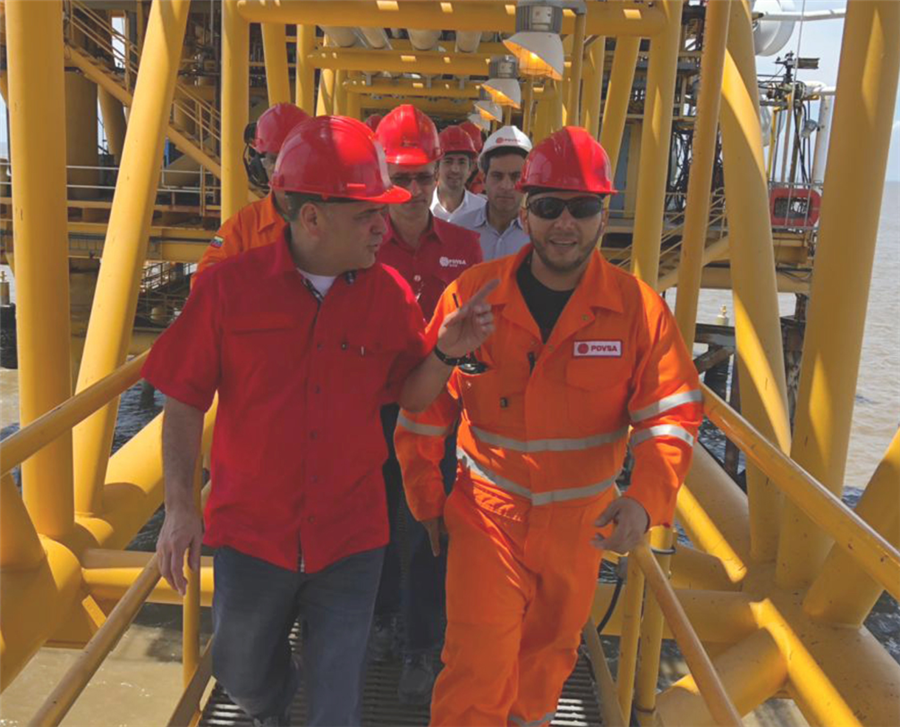Venezuela told to give shares of Citgo parent to gold miner

(Bloomberg) — A Canadian mining company can seize the shares of the owner of Citgo Petroleum Corp. to satisfy a $1.2 billion arbitration award over a Venezuelan gold mine.
The ruling in favor of Crystallex International Corp. may prompt other Venezuelan creditors to scurry to file claims on Citgo. The company is one of the most attractive assets investors could try to seize as the South American nation falls further behind on debt payments and sinks deeper into an economic depression.
More bad news for Venezuela on top of rampant inflation and political unrest.
The brief order didn’t reveal the reasoning of U.S. District Judge Leonard Stark because his full decision was filed under seal. Both sides are set to meet Aug. 10 to discuss making the ruling public, according to court filings.
The decision is more bad news for Venezuela, which is struggling with rampant inflation and political unrest and is entangled in more than a dozen arbitration cases with foreign companies challenging state takeovers during the past decade. President Nicolas Maduro has expressed an interest in restructuring the nation’s billions of dollars in debt but has failed to carry through as sanctions prohibit a transaction with U.S. based investors.
Petroleos de Venezuela SA, the state oil company known as PDVSA, said it couldn’t immediately comment on the judge’s ruling without reviewing it. A representative for Citgo couldn’t immediately be reached for comment.
The two sides have been ordered to confer within a week and meet again with the judge, so the Citgo shares won’t immediately be transferred, said Hans Humes, the chief executive officer of Greylock Capital.
“This seems like an attempt by the court to force a settlement acceptable to both sides,” he said. “Nobody’s getting Citgo until at least one more hearing in Delaware.”
Crystallex sought the shares as compensation after former Venezuelan leader Hugo Chavez nationalized the Las Cristinas gold reserve in 2011. Venezuela expropriated the gold-mine property and turned it over to PDVSA for no consideration, Crystallex argues.
Other creditors have targeted PDVSA assets in the Caribbean region to satisfy more than $2 billion in judgments. In May, ConocoPhillips moved against some of the Venezuela company’s operations on the islands of Bonaire and St. Eustatius after an arbitrator found officials wrongfully confiscated the Houston-based oil company’s property in 2007.
PDVSA’s dollar-denominated bonds due in 2020 are backed by a first-priority lien on a 50.1 percent stake in Citgo Holding Inc. That’s left the notes trading at prices much higher than other Venezuelan securities. The other 49.9 percent of Citgo has been pledged to Rosneft PJSC as collateral for a $1.5 billion loan.
A change in Citgo’s ownership could trigger covenants on both the bonds and the loan.
“It’s panic time if you are a PDVSA 2020 holder,” said Russ Dallen, managing director of Caracas Capital who has followed the case closely. “I think there will be a small rush to get at Citgo assets.”
A group of Venezuela’s creditors holding $8 billion of bonds is exploring options for laying claim to assets held overseas by the Latin American nation as unpaid interest and principal on defaulted bonds since November approaches $5 billion, according to an emailed statement earlier this month from Millstein & Co., the law firm advising the investors.
PDVSA’s lawyers had argued Crystallex couldn’t attempt to seize the holding company’s shares because it didn’t have proper grounds for suing in the U.S. and because it couldn’t show the unit was the Venezuelan company’s “alter ego.”
In November, Crystallex and Venezuelan officials announced they’d reached a settlement of the dispute over the nationalized gold mine. Although approved by a Canadian judge, the pact apparently didn’t fully resolve the fight over the $1.2 billion judgment because Venezuela missed payments under the deal.
The case is Crystallex International Corp. v. Bolivarian Republic of Venezuela, 17-mc-00151, U.S. District Court, District of Delaware (Wilmington).
(By Jef Feeley and Eliza Ronalds-Hannon)
{{ commodity.name }}
{{ post.title }}
{{ post.date }}




Comments